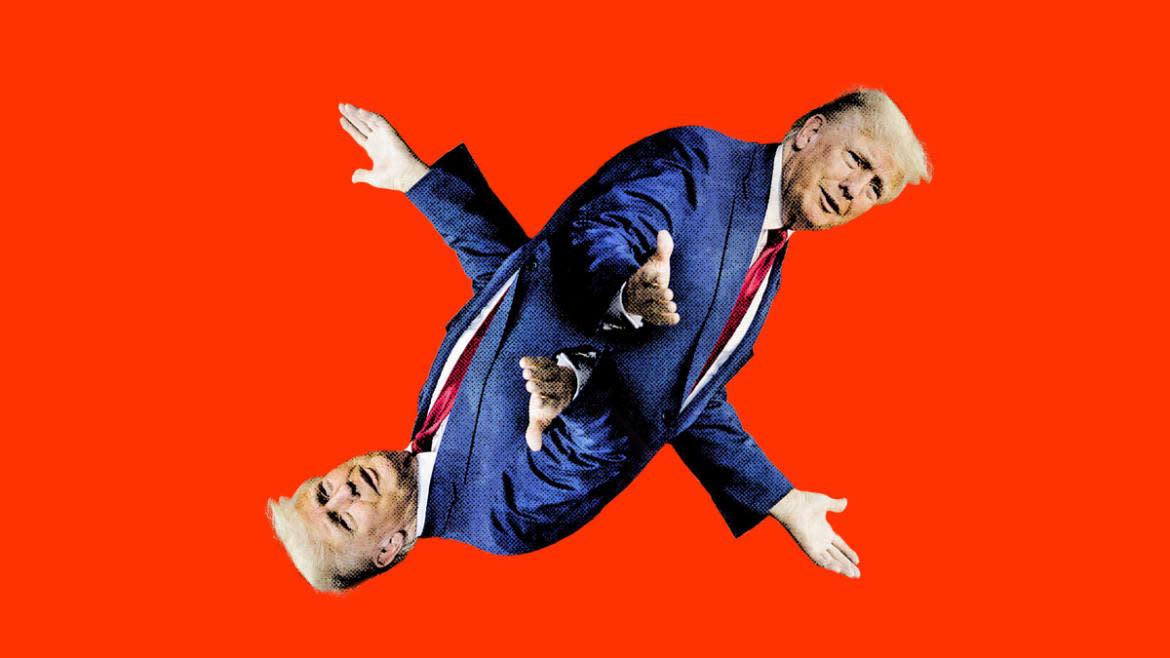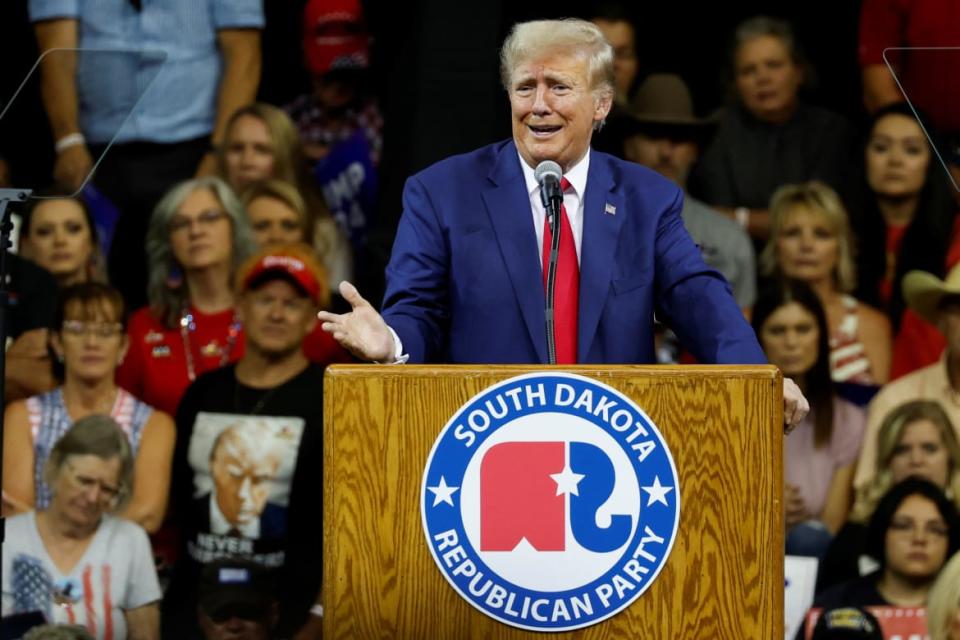Why Trump’s New Argument in the New York AG Case Won’t Save Him

- Oops!Something went wrong.Please try again later.
The New York trial that could bankrupt Donald Trump’s corporate empire is only three weeks away and the former president has bet the farm on the notion that his deals were too long ago to investigate—a ploy that increasingly looks like a dud.
Trump wants to direct Justice Arthur F. Engoron’s attention to the dates he finalized some sizable real estate deals in Chicago, Miami, Washington, and elsewhere. But according to a source familiar with the case, the real action will be focused on the way he kept filing personal financial statements with bogus numbers years later that kept inflating his net worth by what investigators estimate to be some $2.2 billion.
That amount sounds ridiculous, but it added up over time. For example, the real estate tycoon bizarrely faked the size of his own gold-encrusted and marbled Louis XIV-style penthouse at Trump Tower in Manhattan by simply tripling the space from 10,000 to more than 30,000 square feet.
Trump Actually Inflated Net Worth by $3.6 BILLION Per Year, New York AG Says
Nearly every year each loan was outstanding, Trump kept submitting paperwork purporting to estimate his riches. If the judge decides that submitting fake documents resets the clock, New York Attorney General Letitia James will still have a powerful case that could yank the Trump family’s business charters in the financial capital of the world—thus preventing them from legally making a penny from their many buildings and golf courses.
But first, there’s this thorny issue to resolve.
This summer, a New York state appellate court directed Engoron and the AG to figure out when exactly the Trump family deals took place, a pivotal step that needs to be clarified to determine if they fall outside the statute of limitations. (Complicating the matter, the Trump Organization previously agreed to stop the clock to give investigators more time—a legal maneuver that sometimes helps both sides.)
The cutoff goes as far back as July 2014, and it won’t be easy to figure out. For example, investigators claim that Trump’s faked numbers landed him a $170 million Deutsche Bank loan for the Trump International Hotel in Washington, D.C. However, the credit memo approving the loan came just before the cutoff in May 2014, and the deal was closed just after the cutoff in August 2014.

But since that appellate decision, no lines have been drawn. And there are only weeks to go before a behemoth trial that’s scheduled to run for up to 56 days starts on Oct. 2.
“These issues are highly technical, and they are highly dependent sometimes on idiosyncratic features of particular statutes,” said Justin Murray, a professor at New York Law School.
Just last week, Trump’s lawyers made a last-minute push to delay the trial, citing this unresolved issue. Engoron swiftly rejected the timeout request in a pithy, nine-word order. It was the latest sign that the judge has increasingly lost his patience with the Trump crew, having endured their three-plus years of endless delay tactics and defiance of court-issued subpoenas.
The judge is expected to address this timing issue immediately after a court hearing next week. The question is how much of the AG’s $250 billion-plus lawsuit is viable if several Trump deals are considered past the statute of limitations.
A review of past rulings shows that, if the judge sticks to his guns, the Trump family will still face the full brunt of the AG’s civil investigation.
When the Trumps asked the judge to summarily dismiss the entire lawsuit nearly a year ago, their lawyers made a litany of arguments: claiming that the AG didn’t even have the authority to do this, chalking up the entire investigation to a “witch hunt,” and—on this topic—saying that the real estate deals were simply too old to litigate.
Judge Won’t Let Banks and Insurers Hide Their Trump Docs
Engoron tore them apart in a January order, noting that Trump’s lawyers completely misunderstood New York law giving the AG this authority and annoyingly reminded them that he—and an appellate court—had already shot down the “witch hunt” political talking points.
But on the timing issue, the judge called out Trump’s attorneys for continuing to cite the wrong state law to push the false notion that there was an even shorter deadline for the AG to sue.
A closer look at that last point shows the legal strategy of distraction that Trump’s lawyers continue to employ. In court documents, defense attorneys also argued that the law setting up a six-year statute of limitations was only enacted in 2019 and couldn’t possibly be employed by the AG and her investigators. Instead, they argued it should be three years—thus totally excluding basically anything Trump had done.
“The legislature gave no indication that the change was retroactive,” they wrote.
But this was sleight of hand. The state had previously had a six-year deadline. The entire reason New York lawmakers changed the law in 2019 was because they were scrambling to respond to new precedent from the state’s highest court the previous year that suddenly shortened the deadline for one of New York’s powerful anti-fraud laws, the Martin Act. So in reality, the statute of limitations was always meant to be six years. Legislators just bumped it back up.
The First Judicial Department, the very same appeals court that keeps handling the many Trump cases in Manhattan, actually explained this in 2021 in another case. To eliminate any wiggle room or misunderstanding, it clarified that the shortened time window would only apply to relevant activity in “the brief period between June 12, 2018 and August 26, 2019.” And for the sake of example, the appellate court even drew a distinction with another case involving landlords whose actions happened before a separate law’s statute of limitations was extended.
The whole point was to show that the timing of a person’s wrongdoing matters.
This made it all the more curious that Trump’s lawyers cited all of these cases in their own court papers. In court, Judge Engoron has noted that the real estate tycoon’s legal team keeps citing cases that actually say the opposite of the point they’re trying to make.
The judge is now in the position to shoot them down again. He’ll decide how the date cutoff applies to certain Trump real estate deals. Drawing those lines has a real ability to limit the destructive potential of the lawsuit, because the AG is seeking to snatch away any money Trump made by lying about his finances.
But he’ll also decide whether Trump exhibited a pattern of misconduct. If he does, he could give James the “injunctive relief” she requested in her lawsuit: stripping Trump of his business license in New York, choking off his ability to rake in corporate profits. The companies might even end up in receivership, under someone else’s control. And to reach that decision, Engoron won’t necessarily be bound by a narrow statute of limitations. Instead, he could look back as far as the evidence goes.
Murray, the New York law professor, said this kind of wide-angle view of the case is severe indeed.
“Injunctive relief is always about whether the relief is necessary given what you know about this individual, this entity. And they revealed who they are because of their actions—even those outside the limitations period,” he said. “Especially when the fraudulent activities are understood against the backdrop of the entire history of the conduct, which reveals who the person is and their fundamental lack of trustworthiness and the necessity of shutting them down.”
At this point, it’s all up to Engoron. The upcoming court battle is a bench trial, which means there will be no jury. Engoron alone will decide whether Trump lied to banks and insurance companies about his net worth, and he’ll determine any potential punishment.
Get the Daily Beast's biggest scoops and scandals delivered right to your inbox. Sign up now.
Stay informed and gain unlimited access to the Daily Beast's unmatched reporting. Subscribe now.

